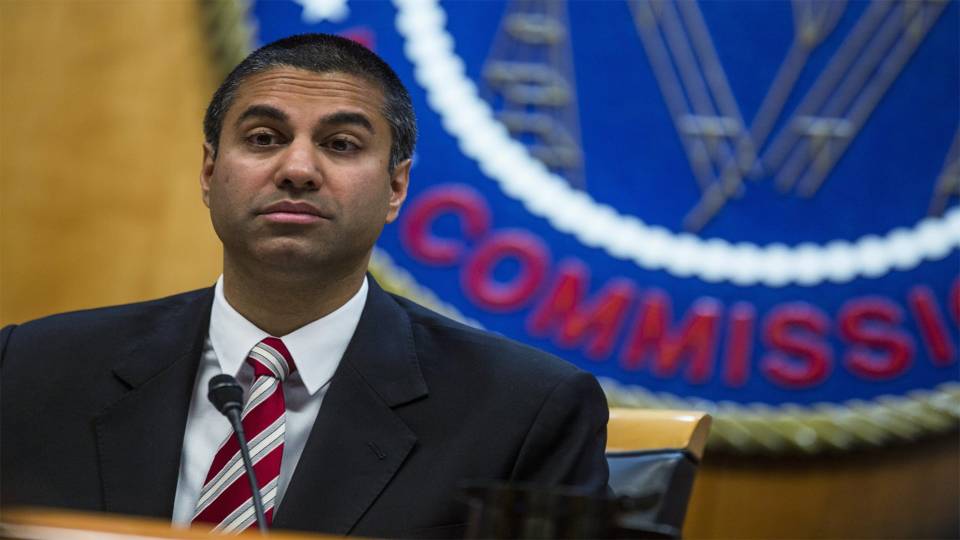FCC Gives Internet Service Providers Power to Determine What Websites its Users Can See and Use
Federal regulators Tuesday outlined their plans for dismantling Obama-era open-internet rules, setting up a clear victory for cable and wireless firms that provide most internet service.
They would create a range of new opportunities for internet providers such as Verizon Communications Inc., Comcast Corp., Charter Communications Inc. and AT&T Inc., enabling them to form alliances with media and other online firms to offer web services at higher speeds and quality. They also would help clear the way for creative pricing and bundling of services to attract more customers.
The changes are expected to be approved at a Federal Communications Commission (FCC) meeting in mid-December.
“Under my proposal, the federal government will stop micromanaging the Internet,” Republican FCC Chairman Ajit Pai said in a statement, adding: “Working with my colleagues, I look forward to returning to the light-touch, market-based framework that unleashed the digital revolution and benefited consumers here and around the world.”
Telecom companies cheered the move.
Verizon said in a statement that it was “very encouraged” by Mr. Pai’s announcement. It added: “We continue to believe that users should be able to access the internet when, where, and how they choose….We are also confident that the FCC will reinstate a framework that protects consumers’ access to the open internet, without forcing them to bear the heavy costs from unnecessary regulation that chases away investment and chills innovation.”
Internet firms, consumer groups and many Democrats, criticized the move as a threat to the open internet.
Democratic FCC Commissioner Jessica Rosenworcel termed the plan “ridiculous and offensive,” adding that it “hands broadband providers the power to decide what voices to amplify, which sites we can visit, what connections we can make, and what communities we create.”
A spokeswoman for Alphabet Inc. unit Google said: “The FCC’s net neutrality rules are working well for consumers and we’re disappointed in the proposal released today.”
The Obama-era rules had required internet service providers to treat all web traffic equally, effectively keeping all corners of the internet accessible to consumers. The rules also limited the providers’ ability to favor content, including their own.
Internet companies and many consumer groups viewed the current rules as crucial for sustaining competition and preventing broadband providers from unfairly dominating the online environment through their control over its pipes.
But critics—including Mr. Pai—argue that the 2015 rules have stifled investment and innovation, and providers also worried the rules could open the door to rate regulation and other new oversight.
Under the FCC move, oversight responsibility for internet providers would again include the Federal Trade Commission as well as the FCC, Mr. Pai said in his statement. The Obama-era rules effectively exempted internet providers from FTC regulation.
“As a result of my proposal, the Federal Trade Commission will once again be able to police [internet providers], protect consumers and promote competition, just as it did before 2015,” Mr. Pai wrote. “Notably, my proposal will put the federal government’s most experienced privacy cop, the FTC, back on the beat to protect consumers’ online privacy.”
The FCC would retain a version of its transparency rule, requiring providers to disclose their net-neutrality practices to consumers.
Many conservatives view the FTC’s case-by-case regulatory approach as more appropriate for the internet economy, to encourage more innovation.
Progressives prefer the FCC’s rule-based approach for the online environment to prevent unfair and anticompetitive practices by internet providers from ever taking root.
The FCC’s official announcement is surfacing just a day after the Justice Department filed suit to block broadband provider AT&T Inc.’s planned merger with media giant Time Warner Inc. on antitrust grounds, suggesting that the Trump administration’s support for big telecommunications combinations has limits.
But consumer groups and others on the left worry that antitrust enforcement won’t be able to keep up with possible anticompetitive harms.
The debate over net neutrality is sure to rage on even after the December vote. The changes are likely to face a range of opposition, including legal challenges.
Activists announced plans to protest at Verizon retail stores across the country on Dec. 7, a week before the scheduled FCC vote. Demonstrations were planned in other cities including Phoenix, Denver, San Francisco, New York, Indianapolis, Boston and Washington.
Democrats also suggested they would try to turn the issue into a political rallying cry for the 2018 elections. The Democratic National Committee put out a statement saying that Democrats “believe the internet must remain a level playing field.”
Incompas, an association that represents a mix of internet, streaming and telecom companies, warned in a statement that “ending net neutrality could cost consumers hundreds of millions in new fees, and should be deeply troubling for all Americans….No one wants to see the internet turned into cable and have to pay more for streaming and other services they love.”






















